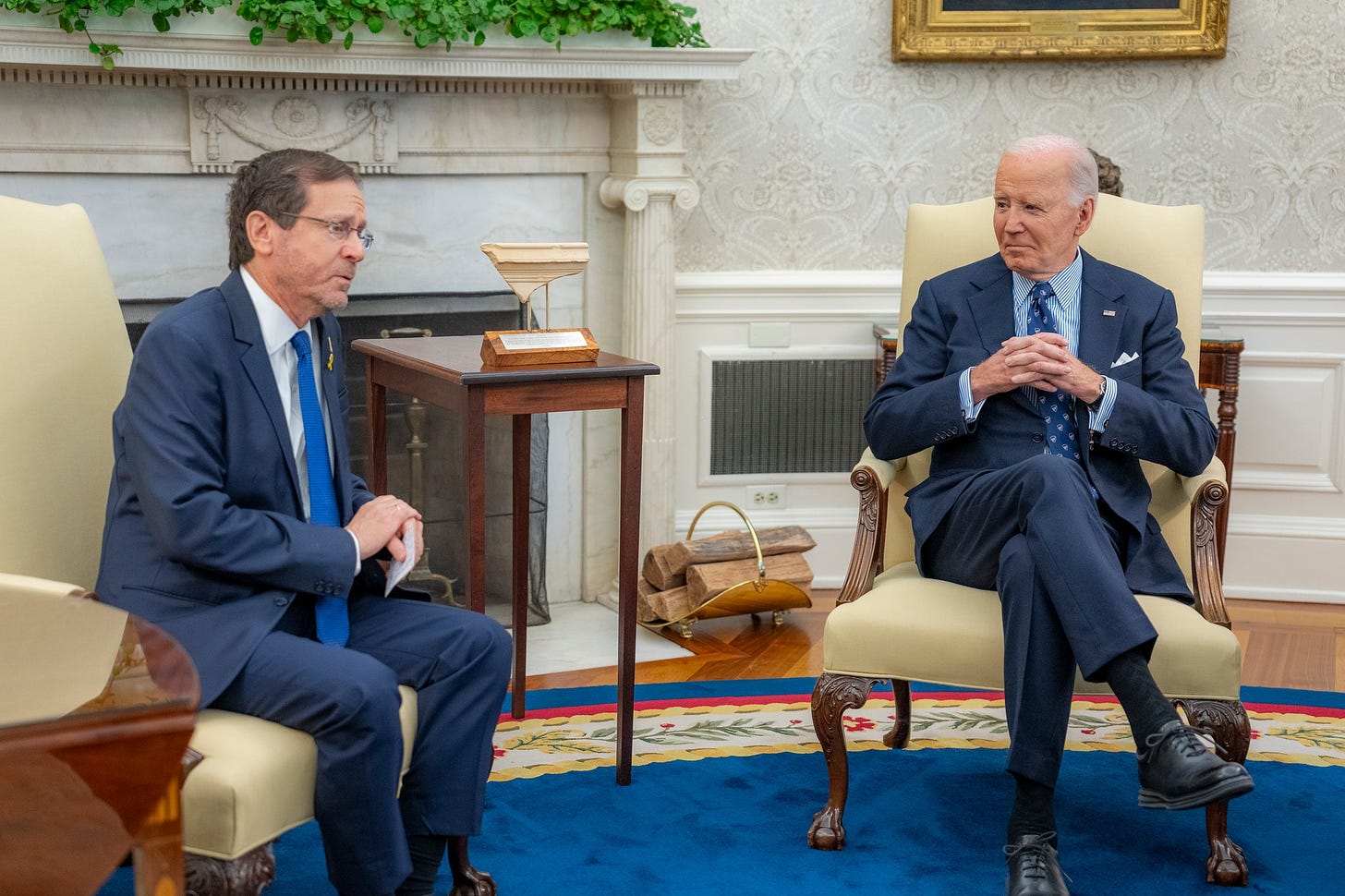President Biden and Israeli President Isaac Herzog held a meeting in the Oval Office at the White House to discuss the ongoing conflict involving Israel and nearby threats. President Biden reaffirmed his commitment to Israel, while President Herzog expressed gratitude for Biden’s support, particularly following the October 7th attack.
Herzog shared news of recent hostilities, including two Israelis killed by rockets from Lebanon and a drone attack on a kindergarten. He emphasized Israel’s need for security and the return of hostages held in Gaza, stating that the threat originates from Tehran, Iran’s capital, which he called the "empire of evil" due to its support for anti-Israel proxies and nuclear ambitions.
Herzog highlighted Biden's longstanding friendship with Israel, noting Biden’s anti-antisemitism efforts and actions in support of Israel. Herzog presented Biden with a symbolic archaeological artifact, thanking him for strengthening Israel. Biden, recalling his family’s support for Jewish causes and affirming his Zionist identity, expressed appreciation for their shared values and partnership.
President Biden also welcomed Indonesian President Prabowo Subianto to the Oval Office, highlighting the 75th anniversary of U.S.-Indonesia diplomatic relations and expressing pride in their strong partnership. Biden emphasized plans to advance a free and open Indo-Pacific with ASEAN at its core, tackle the climate crisis, secure resilient supply chains, and deepen the U.S.-Indonesia strategic partnership, including security cooperation. They also intended to discuss global issues, notably in Gaza and the South China Sea.
President Subianto expressed gratitude for Biden's support, recalling Biden’s congratulatory call upon his election. He acknowledged the U.S. as a valued friend who supported Indonesia’s independence and pledged to strengthen bilateral relations. Both leaders looked forward to their discussions.
First Lady Dr. Jill Biden, at a White House reception celebrating culinary arts in diplomacy, expressed gratitude to Clare Reichenbach and the James Beard Foundation for honoring chefs and commended Ethan Stowell for his leadership. She recalled her family’s love of food and highlighted its role in fostering connection and comfort, as seen recently when chefs like José Andrés helped feed hurricane survivors.
Dr. Biden emphasized the power of food in diplomacy, noting that meals at White House events and state dinners unite people from diverse cultures and reveal each country’s unique story. She praised the American Culinary Corps for representing the nation’s rich diversity through innovative, culturally blended cuisine. Biden also honored former White House Executive Chef Cris Comerford, who described cooking in America as “jazz,” embodying creativity and unity.
The Biden-Harris Administration is leveraging the U.S.'s climate leadership to drive global climate action at the 29th U.N. Climate Change Conference (COP29) in Baku, Azerbaijan, presenting new policies and investments. Here’s a high-level summary:
Domestic Climate Action: Through initiatives like the Inflation Reduction Act and Bipartisan Infrastructure Law, the U.S. has generated $450 billion in clean energy investments and created over 330,000 jobs. Major domestic focuses include methane emission reduction, nuclear energy expansion, and geothermal energy advancement.
Global Climate Action: The U.S. is urging the global reduction of super pollutants, including methane, and supporting international nuclear and renewable energy projects. The U.S. and China are leading the reduction in methane, with 155 countries endorsing the Global Methane Pledge.
Financial Support for Climate Resilience: The U.S. committed to scaling climate finance, increasing funds from $1.5 billion in FY21 to $9.5 billion in FY23, with a goal of $11 billion by 2024. Efforts include a $1 billion guarantee for Asia-Pacific climate finance, supporting a $255 million coal plant phase-out in Indonesia, and facilitating clean energy projects in Africa.
Building Resilience: The U.S. is enhancing global resilience to climate impacts with $3 billion in adaptation finance, climate data, early-warning systems, and technical support for small island developing states (SIDS). Major projects are improving agriculture in Zambia, bolstering Mozambique’s coastal resilience, and strengthening grid resilience in Côte d’Ivoire.
Women and Girls' Leadership: Programs like the Women in the Sustainable Economy (WISE) Initiative, USAID grants, and the Women in Clean Energy and Minerals program advance women’s roles in climate action, focusing on clean energy and agricultural empowerment across Tunisia, Latin America, and globally.
These commitments underscore the U.S.'s emphasis on integrating economic opportunity, resilience, and gender equity within climate initiatives while aiming to keep global warming within the 1.5°C threshold.
Press Secretary Karine Jean-Pierre held a briefing highlighting several key issues and updates. President Biden welcomed Indonesian President Joko Widodo and Israeli President Isaac Herzog, emphasizing the 75-year diplomatic ties with Indonesia and a strong commitment to Israeli security. Discussions with Widodo centered around mutual challenges and goals, including food security, clean energy, regional peace, and strengthening relations within the Indo-Pacific. Herzog’s visit underscored Biden’s unwavering support for Israel’s security.
On the topic of the Israel-Gaza conflict, Jean-Pierre noted that while Israel has taken steps to allow humanitarian aid into Gaza, further action is required. The U.S., as the largest provider of humanitarian assistance to Gaza, remains committed to easing the suffering in the region, with the ultimate goal of ending hostilities. The administration continues to push for increased aid to meet the dire needs of Palestinians.
President Biden also invited President-elect Trump to the White House as part of a peaceful transition of power, reflecting Biden’s commitment to democratic norms and institutional traditions. While the specifics of their agenda remain private, the meeting aims to demonstrate a smooth transfer of leadership. Additionally, the administration reaffirmed its foreign policy stance, emphasizing support for Ukraine and bolstering alliances ahead of Biden’s attendance at the G20 summit. The White House also urged Indonesia to align any agreements with China regarding the South China Sea with international law.
The U.S. remains actively engaged in hostage negotiations, particularly concerning American hostages held by Hamas in Gaza. Jean-Pierre mentioned that the administration is coordinating with Qatar and Egypt despite recent challenges in mediation efforts and that freeing the hostages remains a top priority.
In the final months of Biden’s term, the administration plans to focus on advancing judicial nominations and key legislative priorities, including healthcare expansion and climate policy initiatives. These policies are critical to American well-being, and the administration hopes to secure bipartisan support to avoid future rollbacks.
Questions were raised about Elon Musk’s potential influence over Trump’s transition team, but the White House declined to comment, emphasizing Biden’s focus on an orderly and efficient transition instead. The briefing underscored the administration’s commitment to maintaining democratic principles and furthering its agenda in its remaining time in office.
President Biden welcomes Israel’s President Isaac Herzog to the Oval Office






A good start to Building resistance for the island states
So pleased to see the WH addressing a 1.5 initiative on the climate and focusing on aid to the Palestinian families.
The continual effort to stop the war on Gaza and a two state solution towards peace.